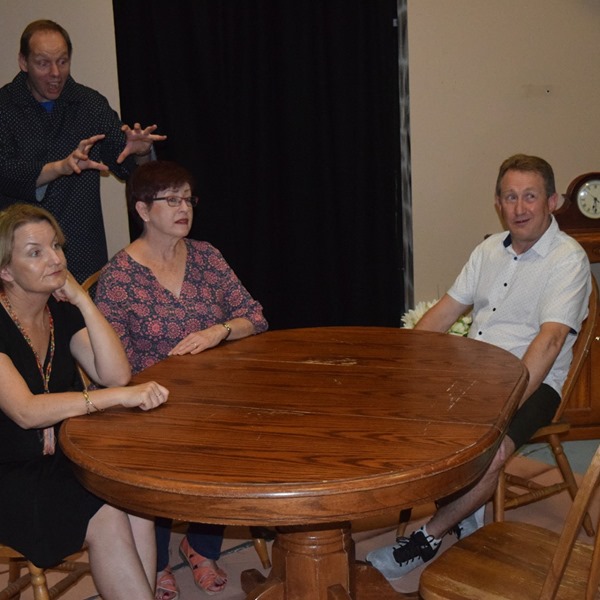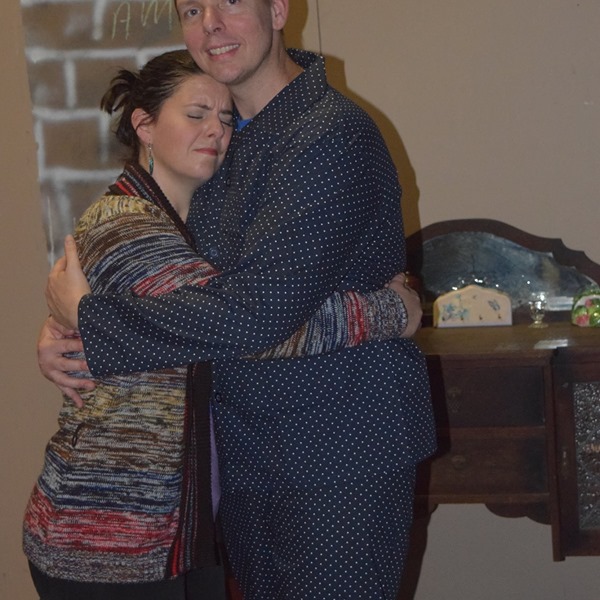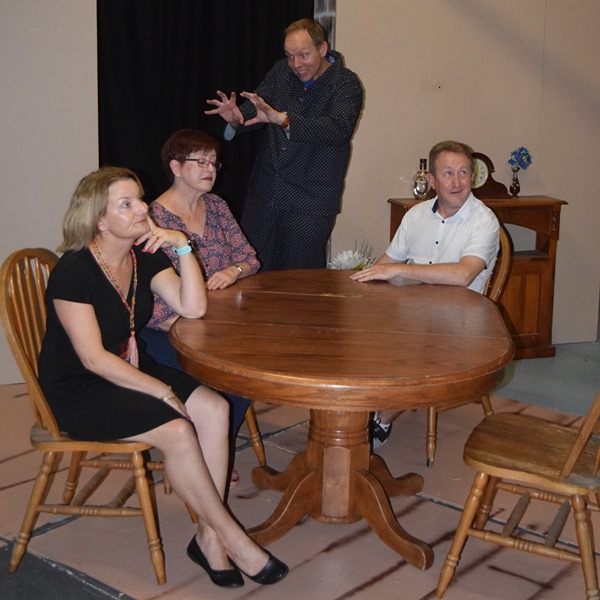
‘Table Manners’ // Act 1 Theatre
‘Table Manners’ was homey.
Act 1 Theatre has laid out their finest crockery for their latest dramatic comedy, ‘Table Manners’. The play is the first in a trilogy by Alan Ayckbourn that follows the relationships between three couples on a relaxing weekend where lovers are unexpectedly tested and family feuds are created.
The story starts off peachy keen in the family household where Annie, who spends time taking care of her invalid mother, has planned a holiday. Brother and sister in law, Tom and Ruth, come to the house in order to take up caring duties while uptight Annie has her rest. However, things fall apart when Annie announces that she is not just going on a holiday by herself, but with sister’s husband Norman!
Director Jeff Mitchell has curated a play where audiences are able to peak into the lives of a family who clearly love each other but just don’t really like each other. While the fourth wall is clearly present in this production, the characters did a large amount of cheating to the front and standing downstage when presenting monologues. In what was otherwise a ‘fly-on-the-wall’ production, these moments broke audiences out of the narrative on stage and did not fit within the realistic nature of the play. It would have been nice to see the actors fully settle into the world of the play and worry less about the audience.
That being said, Mitchell implemented blocked which allowed the actors to freely move around the stage. Every area of the space was effectively used, from the far reaches of the room to the front of the stage. The acceptance of the entire stage as an area of play assisted the audience in cementing the action in the family dining room.
The play was static in setting, which gave audiences an interesting perspective on the narrative of the play. Characters exited from stage right and left into other rooms of the house where the play continued offstage, where audiences were not privy to the information shared. While the story unfolded from the perspective of the dining room, the audience witnessed what the dining room experienced.
Set design by Terry Frawley was fairly simple with a large dining table centre stage, a few chairs scattered around the room and a side-board table where cutlery and crockery was stowed. By placing the table at the centre of the room it was clear that this was the heart of the family.
Unfortunately at times, set changes were long and the curtain was closed for an extensive amount of time. Thankfully, this only occurred twice throughout the production, however, the transition lasted about five minutes and pulled the audience out of the action; to the point where the crowd started chatting in the darkened theatre waiting for the action to begin again. It may have been beneficial to tighten these transitions or find a way to creatively clear the set and change the actors clothes in a more time-efficient manner.
‘Table Manners’ is intended to be set in England, with references to English towns scattered throughout the script, but in Act 1 Theatre’s production, actors maintained their Australian accents. While only a minor issue, it would have been beneficial to localise the production to where the accent choice would have made more sense and ultimately avoid audience confusion.
The characters lay at the crux of this production, and as such, the comedic timing of the actors. Set, lighting, props and sound were all extremely simplistic and therefore the play hinged on these nuanced performances. There was nowhere to hide and, while most of the cast rose to the challenge, Michael Alizzi, was certainly a stand out as Tom. Alizzi embodied his character in every moment and, while some of the cast lent toward a more pantomime and over dramatised acting style, Alizzi was perfectly balanced. Every movement was made with intention and he was not afraid to remain still to deliver dialogue. His character was clear from the outset and Alizzi should be commended for delivering such a well-executed performance.
Bernadette Smith as the poised Sarah provided another great portrayal. It was a pleasure to watch Sarah’s character arch as she grappled with her own moral compass and how to keep the family together. Smith handled the character’s break down with grace and realistic energy that was a delight to watch.
David Adams as Reg and Charlie Langford as Norman performed with bucket loads of energy and commitment. The audience embraced the bumbling men and laughed along with their general absurdity when faced with dramatic scenarios. Unfortunately this energy was, at times, to their detriment and they lacked the nuance that would root their characters in the otherwise realistic setting. Langford’s extensive monologue at the beginning of Act 2 was impressive in its length and lively input, but it lacked dynamics. What is clearly a very challenging monologue could have been improved with a little more pacing, emotional connection and more variation of the voice to settle into a more natural rhythm.
Kim Barrett-Coade as Ruth and Elizabeth Scales as Annie rounded out the cast and both delivered comedic and well-executed performances. Scales navigated the turbulent journey of Annie with skill and hilarity. Audiences both laughed and sympathised with her character as she found herself stuck between two love interests, neither entirely welcomed. While the character was naturally a little unsure in her environment, Scales may have benefited from allowing herself to be a little more planted in the space and her characterisation. In a theatre that is so intimate and revealing, every single movement needs to be made with intention and clear direction. Swaying and fluttering hands can be used sparingly, however, some movements made by Scales’ contradicted the strength of Annie’s character. While moments of passion and anger were well executed, the quieter moments within the script lacked surety of movement. This was primarily evident in Annie’s moments with Sarah. There was a beautiful ebb and flow in these scenes which could have been further amplified with every single movement being made with intention and clarity.
Barrett-Coade as the uninterested and vain Ruth embraced her brief time on stage with a fully formed and equally hilarious character. While some comedic choices would have worked just as well with more subtlety, audiences couldn’t help but admire and appreciate the self-obsessed wife.
Act 1 Theatre’s ‘Table Manners’ provided an easy-going night at the theatre with plenty of laughs in tow. While some moments may have needed tightening, the heart and spirit of the cast and its production team shone through. Local plays make up such a vital part of the community theatre scene and Act 1 Theatre should be commended for giving this delightful play a home on their stage.









